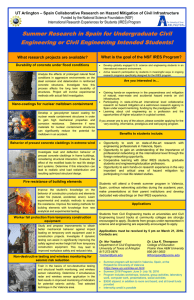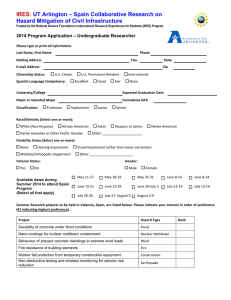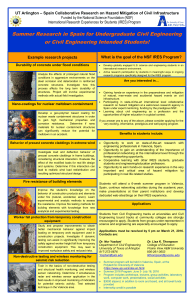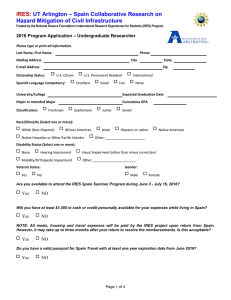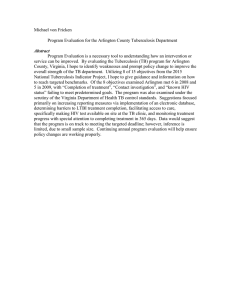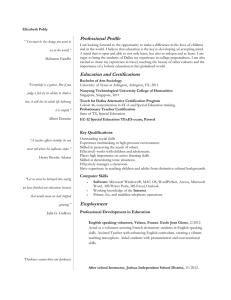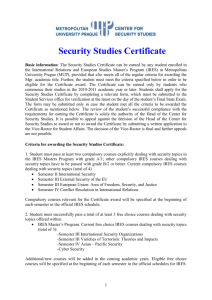Document 12520646
advertisement
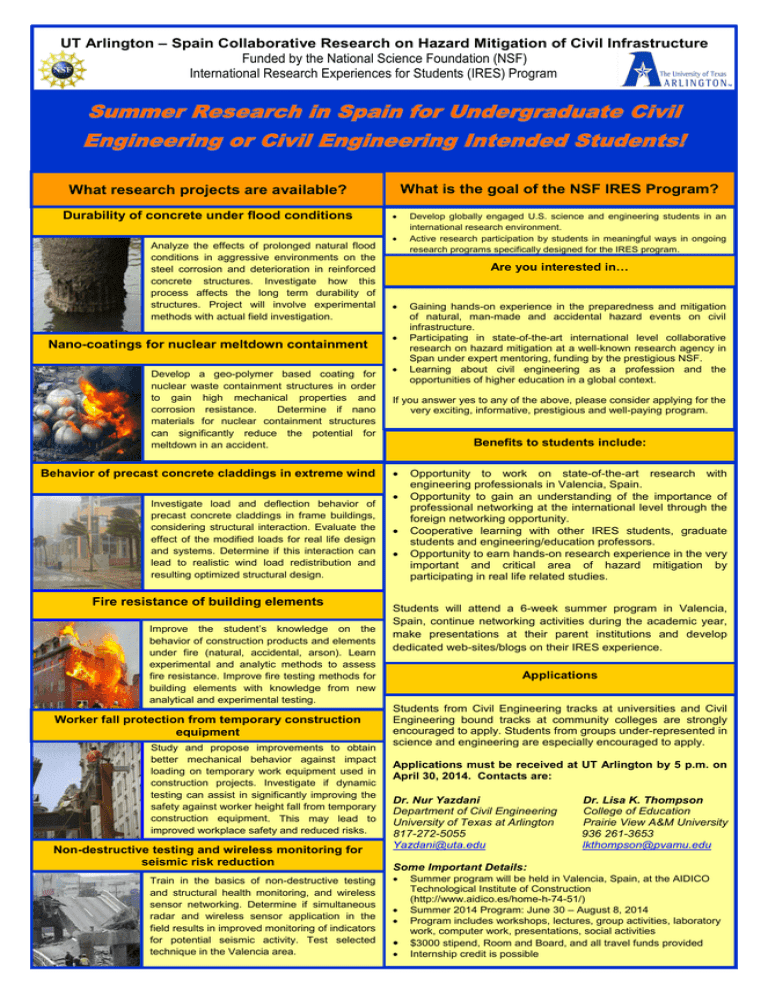
UT Arlington – Spain Collaborative Research on Hazard Mitigation of Civil Infrastructure Funded by the National Science Foundation (NSF) International Research Experiences for Students (IRES) Program What research projects are available? Durability of concrete under flood conditions Analyze the effects of prolonged natural flood conditions in aggressive environments on the steel corrosion and deterioration in reinforced concrete structures. Investigate how this process affects the long term durability of structures. Project will involve experimental methods with actual field investigation. Nano-coatings for nuclear meltdown containment Develop a geo-polymer based coating for nuclear waste containment structures in order to gain high mechanical properties and corrosion resistance. Determine if nano materials for nuclear containment structures can significantly reduce the potential for meltdown in an accident. Behavior of precast concrete claddings in extreme wind Investigate load and deflection behavior of precast concrete claddings in frame buildings, considering structural interaction. Evaluate the effect of the modified loads for real life design and systems. Determine if this interaction can lead to realistic wind load redistribution and resulting optimized structural design. Fire resistance of building elements Improve the student’s knowledge on the behavior of construction products and elements under fire (natural, accidental, arson). Learn experimental and analytic methods to assess fire resistance. Improve fire testing methods for building elements with knowledge from new analytical and experimental testing. Worker fall protection from temporary construction equipment Study and propose improvements to obtain better mechanical behavior against impact loading on temporary work equipment used in construction projects. Investigate if dynamic testing can assist in significantly improving the safety against worker height fall from temporary construction equipment. This may lead to improved workplace safety and reduced risks. Non-destructive testing and wireless monitoring for seismic risk reduction Train in the basics of non-destructive testing and structural health monitoring, and wireless sensor networking. Determine if simultaneous radar and wireless sensor application in the field results in improved monitoring of indicators for potential seismic activity. Test selected technique in the Valencia area. What is the goal of the NSF IRES Program? Develop globally engaged U.S. science and engineering students in an international research environment. Active research participation by students in meaningful ways in ongoing research programs specifically designed for the IRES program. Are you interested in… Gaining hands-on experience in the preparedness and mitigation of natural, man-made and accidental hazard events on civil infrastructure. Participating in state-of-the-art international level collaborative research on hazard mitigation at a well-known research agency in Span under expert mentoring, funding by the prestigious NSF. Learning about civil engineering as a profession and the opportunities of higher education in a global context. If you answer yes to any of the above, please consider applying for the very exciting, informative, prestigious and well-paying program. Benefits to students include: Opportunity to work on state-of-the-art research with engineering professionals in Valencia, Spain. Opportunity to gain an understanding of the importance of professional networking at the international level through the foreign networking opportunity. Cooperative learning with other IRES students, graduate students and engineering/education professors. Opportunity to earn hands-on research experience in the very important and critical area of hazard mitigation by participating in real life related studies. Students will attend a 6-week summer program in Valencia, Spain, continue networking activities during the academic year, make presentations at their parent institutions and develop dedicated web-sites/blogs on their IRES experience. Applications Students from Civil Engineering tracks at universities and Civil Engineering bound tracks at community colleges are strongly encouraged to apply. Students from groups under-represented in science and engineering are especially encouraged to apply. Applications must be received at UT Arlington by 5 p.m. on April 30, 2014. Contacts are: Dr. Nur Yazdani Department of Civil Engineering University of Texas at Arlington 817-272-5055 Yazdani@uta.edu Dr. Lisa K. Thompson College of Education Prairie View A&M University 936 261-3653 lkthompson@pvamu.edu Some Important Details: Summer program will be held in Valencia, Spain, at the AIDICO Technological Institute of Construction (http://www.aidico.es/home-h-74-51/) Summer 2014 Program: June 30 – August 8, 2014 Program includes workshops, lectures, group activities, laboratory work, computer work, presentations, social activities $3000 stipend, Room and Board, and all travel funds provided Internship credit is possible IRES: UT Arlington – Spain Collaborative Research on Hazard Mitigation of Civil Infrastructure Funded by the National Science Foundation’s International Research Experiences for Students (IRES) Program. 2014 Program Application – Undergraduate Researcher Please type or print all information. Last Name, First Name Phone Mailing Address City State E-mail Address Zip Citizenship Status: U.S. Citizen Spanish Language Competency: U.S. Permanent Resident Excellent Good International Fair None University/College Expected Graduation Date Major or Intended Major Cumulative GPA Classification: Freshman Sophomore Junior Senior Race/Ethnicity (Select one or more): White (Non-Hispanic) African American Native Hawaiian or Other Pacific Islander Asian Hispanic or Latino Native American Other: _____________________ Disability Status (Select one or more): None Hearing Impairment Visual Impairment (other than minor correction) Mobility/Orthopedic Impairment Other:_______________________ Veteran Status: Yes Gender: No Available dates during Summer 2014 to attend Spain Program (Select all that apply) Male Female May 11-17 May 18-24 May 25-31 June 8-14 June 8-14 June 15-21 June 22-29 June 29-July 5 July 13-19 July 13-19 July 20-26 July 27- August 2 August 3-9 Summer Research projects to be held in Valencia, Spain, are listed below. Please indicate your interest in order of preference (#1 indicating highest preference). Project Hazard Type Durability of concrete under flood conditions Flood Nano-coatings for nuclear meltdown containment Nuclear Meltdown Behaviour of precast concrete claddings in extreme wind loads Wind Fire resistance of building elements Fire Worker fall protection from temporary construction equipment Construction Non-destructive testing and wireless monitoring for seismic risk reduction Earthquake Page 1 of 3 Rank Please answer the following questions in the space provided (Do not exceed the boxed spaces). Why would you like to participate in the IRES program? What benefits do you believe you will gain from the IRES project?; What are your future plans after graduation? The following items must also be submitted in order for your application to be complete: Official Transcript o An official transcript is required; please submit an unofficial copy with your application. o Please do not forget to request an official transcript from your college/university. STEM Faculty Member Recommendation (form provided) The 2014 IRES Program will tentatively commence on June 30 and end on August 8, 2014. Applications must be received by UT Arlington no later than 5:00 p.m. on April 30, 2014. Applications may be e-mailed to: Rebekah Roskens at Rebekah.Roskens@mavs.uta.edu, or mailed to: Rebekah Roskens, Dept. of Civil Engineering, Box 19308, University of Texas at Arlington, Arlington, TX 76019. These are security-sensitive positions and a criminal background check will be conducted on the selected students. Page 2 of 3 UT Arlington IRES Site for Hazard Mitigation of Civil Infrastructure Funded by the National Science Foundation and the International Research Experiences for Students (IRES) FACULTY RECOMMENDATION FORM Instructions to Applicant: Please complete the upper portion of the evaluation form before submitting it to the evaluator. The evaluator must be an engineering/science/mathematics professor who has taught you in one or more 2000-level or higher courses. Applicant Last Name First Name Major MI Evaluator’s Name In accordance with the Family Education Right and Privacy Act of 1974, you may waive your right to inspect this recommendation by signing the statement below. Should you decide not to waive the right, you will have access to the recommendation if you enroll at The University of Texas at Arlington. I hereby waive my right of access to this recommendation. Student Initial Student Signature: Date: Instructions to the Evaluator: Please rate the applicant with others of similar age and academic level by selecting the response (1-5) that comes closest to your judgment from the following scale. 1-Excellent 2-Good 3-Satisfactory 1 4-Poor 2 5-Unable to Judge 3 4 5 Knowledge of Field Intellectual Ability Motivation to Conduct Research Writing Ability Oral Expression Emotional Expression Working with Others Analytical Ability Punctuality Class Attendance Comments: Use a separate letter if desired. The applicant has taken: None of my classes One of my classes Two or more of my classes Evaluator Signature E-mail Address Office Phone University/College Department ________________________________________ Please enclose your recommendation in a signed and sealed envelope, and return it to the applicant. Thanks a lot for your assistance. Page 3 of 3
